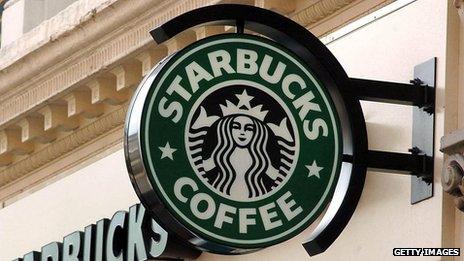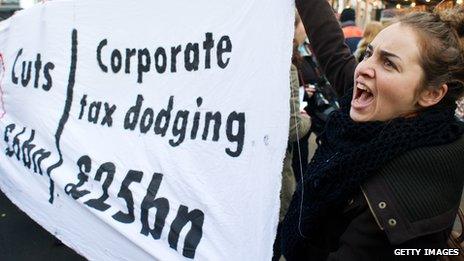The tax choices faced by companies
- Published
- comments

There are two lines of argument used by companies that are most aggressive in reducing their liability to UK corporation tax.
The first one is that they have a "fiduciary" duty to their shareholders (which broadly means that they can be sued or sacked by their shareholders if they wilfully reduce reported profits).
The second is that they do tons of other stuff for the community (so Google - which was criticised by MPs for paying relatively little UK corporation tax - flags up its contributions to an entrepreneurial hub in east London and its work with an education charity, inter alia).
But as directors of companies admit to me, all businesses have discretion about how they organise their tax affairs. The fiduciary duty on the directors does not oblige them to use the most extreme legal techniques to minimise profits and tax liabilities.
How so?
Well, there is what has been described as a "licence to operate" (an idea promoted by the Royal Society of Arts and the think tank Tomorrow's Company), which is broadly that the most successful companies over the long term are those that are responsible corporate citizens.
Companies perceived by people, politicians and media as, in some sense, not making a proper contribution to the societies from which they extract their revenues and profits, will over time become marginalised within those societies - even resented by the customers and suppliers whose goodwill they require.
So it is quite normal on company boards for there to be discussions about how zealous to be in avoiding tax - choices are available to businesses about where to locate costs.
And, to repeat, it is not always rational to maximise profits in countries where taxes are lowest and to maximise losses in countries where taxes are highest, if in doing so the licence to operate is eroded in a country where there are important customers.

UK Uncut has targeted companies it believes are not paying enough tax
This was the thinking behind Starbucks' highly unusual decision to donate £10m a year in "pseudo tax" to HM Treasury's coffers for a minimum of two years.
As a prominent business leader put it to me slightly cynically, that £10m was a "marketing cost" (which, who knows, might be offsetable against Starbucks's tax bill in another part of the world).
Starbucks felt more under pressure than most businesses to make this gesture because its hundreds of shops are natural targets for the kind of protests organised by lobbying groups such as UK Uncut.
But although Starbucks is more vulnerable than most businesses to such campaigning, it is not anomalous.
And some would say that in a way it has joined the ranks of the protestors, by highlighting the discretion that boards have to pay or not pay tax.
Which, of course, does not absolve the government from responsibility for writing tax rules in such a way as to prevent companies paying significantly less than the official corporation tax rate - which, of course, is not easy in a globalised world where businesses can move their domiciles and can shunt revenues more or less wherever they choose.
And here's the rub for the UK.
There does seem to be evidence that companies which think of themselves as British - by dint of who owns them - are more squeamish about minimising the tax they pay in the UK.
Or to put it another way, the further away a board of a company is from the noise of the press in the UK, the anger of social media users, or the angst of British politicians, the less worried that board will be about the perception that its company is not paying its way in the UK.
There may be a hidden cost of what has arguably been this country's central industrial policy of the past 30 years, which is that all businesses are for sale to foreigners at the right price: the systematic transfer into overseas hands of so many UK companies may have contributed to long-term erosion of corporation tax revenues.